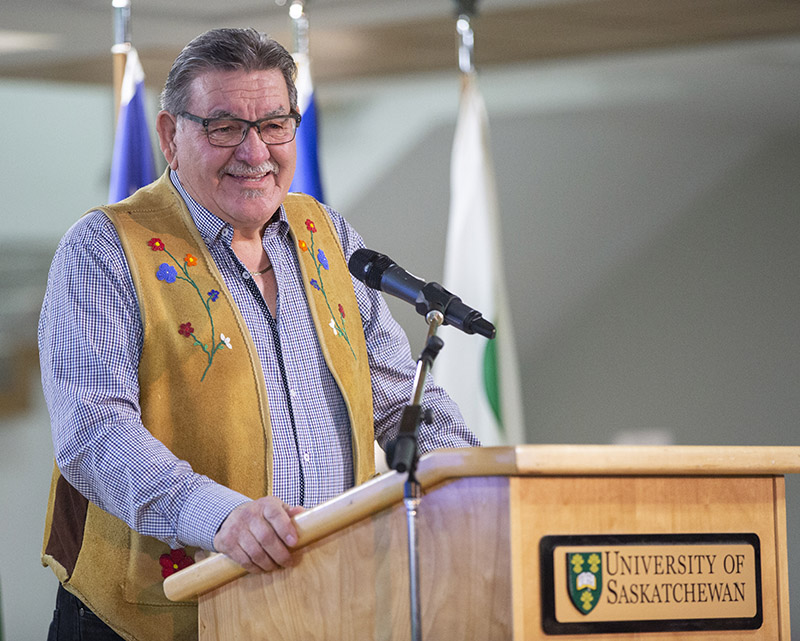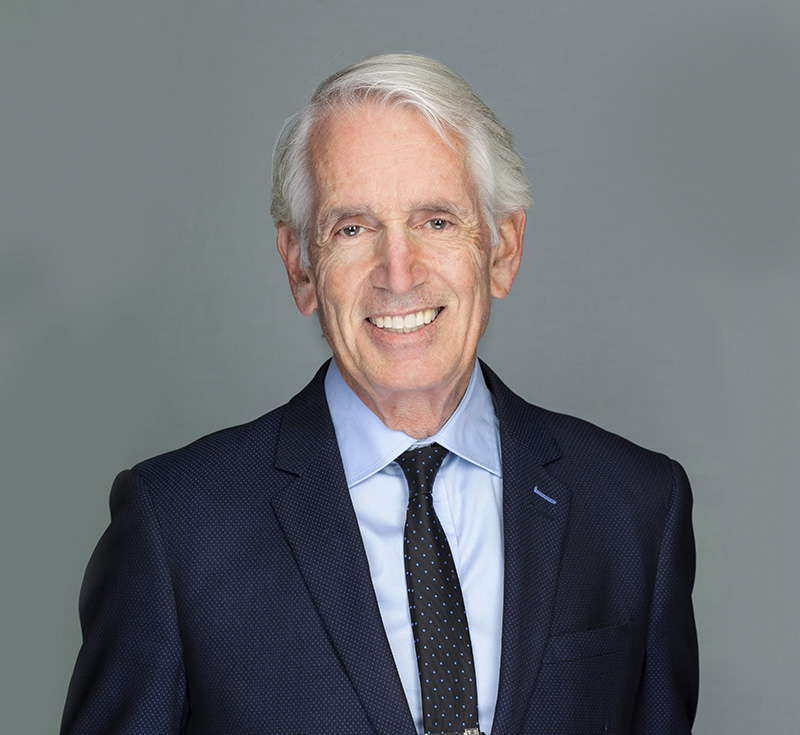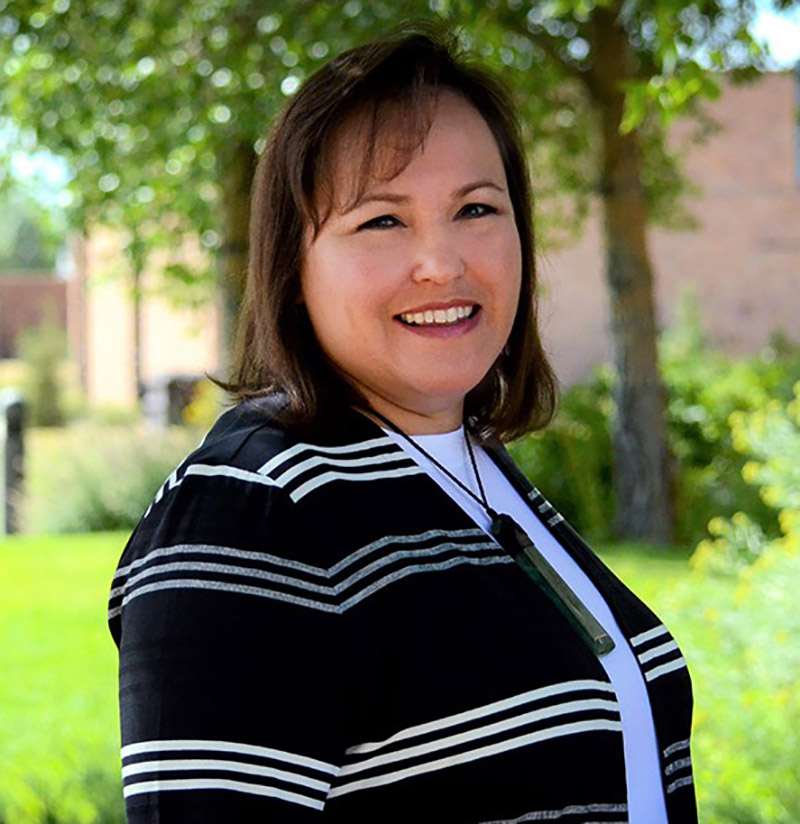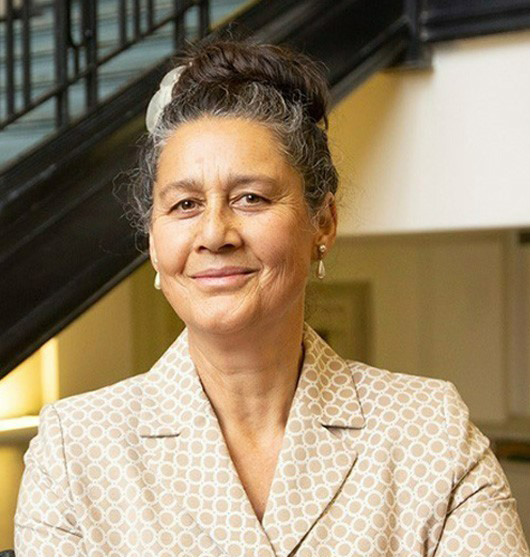Indigenous membership/citizenship verification policy a positive step forward for USask
Grounded in the guidance of Elders and led by Indigenous community partners, the University of Saskatchewan (USask) has taken another step forward in Indigenization on the path to reconciliation.
By James ShewagaLed by an all-Indigenous task force, the university recently released a progressive policy guiding First Nations, Métis and Inuit membership/citizenship verification at USask, the product of months of groundbreaking work and careful consideration by a 27-member task of Elders, Knowledge Keepers, Language Teachers and other Indigenous community and campus leaders.

For Métis Elder Norman Fleury, who has been dedicated to Michif language preservation and revitalization at the university for close to a decade, it was an honour to take part in the task force, working together with other Indigenous community leaders to guide the university’s path forward.
“Our task force was built around the inclusiveness at the university because we are Indigenizing the university,” said Fleury. “We had people sitting on that task force who were very complementary and were very spiritually connected. We were connected through our language and our culture, our customs, our protocols, our history.
“We all came to the table with a good heart and with good intentions, as we all do as Indigenous people. Reconciliation is when you make positive change, and now we have the process to move forward. And now we are telling our own story and that is the strength of this agreement that we have.”
The Indigenous-led task force – supported by a 20-member advisory circle of university representatives – began its work in January 2022 and completed the policy six months later in June. USask’s Board of Governors formally approved the policy on July 9, with implementation currently underway.
“We are indebted to our Indigenous partners who have helped lead this important initiative, and particularly grateful for the guidance and knowledge of the Elders whose voices have helped shape this new approach for the university,” said USask President Peter Stoicheff. “This policy supports USask’s continued commitment to Indigenization and to transformative decolonization leading to reconciliation. The policy could not have been developed without the leadership provided by Indigenous community members, on and off campus.”

The task force included representatives from Saskatoon Tribal Council, Office of the Treaty Commissioner, Métis-Nation Saskatchewan, Federation of Sovereign Indigenous Nations, and Prince Albert Grand Council. The members tackled the complicated work of developing new policy created for and by Indigenous communities and governments – rather than the university – to determine how to verify who has Indigenous membership/citizenship when it comes to applying for USask positions, grants, scholarships and supports specifically for Indigenous peoples.
For USask’s Vice-Provost Indigenous Engagement, Dr. Angela Jaime (PhD), who chaired the task force, the new policy builds on ohpahotān|oohpaahotaan, the Indigenous Strategy gifted to the university by Elders last year, and a significant step forward in the partnerships developed between USask and the Indigenous communities it serves.
“This is about Indigenous governments deciding who has membership, who has citizenship, and how are they connected to their (Indigenous) communities,” said Jaime, a member of the Pit River Tribe of Northern California. “A lot of people want to make it about identity, but identity is a personal piece of who you are.”
Jaime said the policy is believed to be the first of its kind in the country, with Fleury hopeful that the work of the task force can help guide other universities across the country to take this important step forward in guiding Indigenous membership/citizenship verification.

“These teachings at the university, this policy, this can now be a model all across the homeland where there is Indigenous people, if they don’t have (a policy in place),” said Fleury. “It can be implemented and people can use that and they can create something that can really Indigenize these universities.
“We built it and the university recognized it, and it is about teaching, also. The university saw that the academia world cannot verify us and they are starting to recognize through our teachings that we are now the authorities. So that is the strength of it. We are solidifying our teachings, our customs, our protocols, the knowledge that we are sharing, and we have to make sure it is safe, and we are doing that by working together here.”
For USask Provost and Vice-President Academic Dr. Airini (PhD), the new policy further supports the university’s ongoing commitment to Indigenization.
“Through the leadership of Indigenous communities, the university has learned anew how Indigenization is about strengths and meaningful collaboration,” said Airini. “Looking at what the deybwewin task force was able to achieve in a short period working in an entirely unique situation, I believe this speaks to reconciliation and that our university is listening,” said Airini. “The potential of Indigenous peoples has never been greater and this is an example of solutions being created in partnership.”
Both Airini and Jaime said reaction to the new policy has been largely positive from the campus community.
“There is no perfect solution to many of these situations in academia, but this is about problem-solving and thinking through what the best approach is alongside Indigenous partners.” said Jaime. “This is a living document. An Indigenous-led standing committee will be established to help guide us and be conscientious and caring with individuals. For those that don’t have the documentation the community is requesting we accept, we will work with them and their community.”

Carson Magnuson, an Indian Teacher Program Education Program advisor in the College of Education, is one of the members of USask’s campus community who supports the new policy, and the work of the task force.
“They worked well with the community and it wasn’t just an internal process,” said Magnuson, who was raised in Saskatoon and is Cree from the Kawacatoose First Nation in Treaty 4 territory. “And senior leadership has taken a role in facing this issue head-on, so I am happy with the result of what has been put out so far. I think there is a lot of work to be done going forward and that is represented in the policy and represented in the implementation strategy as well.”
The Métis-Nation Saskatchewan registry and First Nations status cards will be among the resources used by Indigenous communities and governments in helping determine membership/citizenship verification for Indigenous-specific support and positions at the university moving forward.
“The decisions about verification rest with the Indigenous communities,” said Airini. “We are committed to building respectful partnerships, and to moving forward. The bottom line is we need to make sure that where we have an Indigenous-specific role or Indigenous grant at USask, it will be held by an Indigenous person.”
The university is now in the process of updating the online system for uploading documentation and creating information material for members of the community – on and off campus – to learn more about the new policy. Moving forward, the permanent Indigenous-led standing committee will be finalized this fall to develop the implementation plan and procedures, while Jaime and her team will work on connecting and consulting with all First Nations communities across the province.
“To support respectful relations, we are reaching out to all the First Nations communities in Saskatchewan specifically to meet with them, to talk with them, either through Tribal Council or directly,” said Jaime. “There are bands that are not part of tribal councils, so we will go to them directly and through conversations we will seek to create Band Council Resolutions and MOUs (Memorandums of Understanding) with each of those communities. We will be asking their advice, examples of verification, and then working directly with them moving forward to support Indigenous people at USask.”

